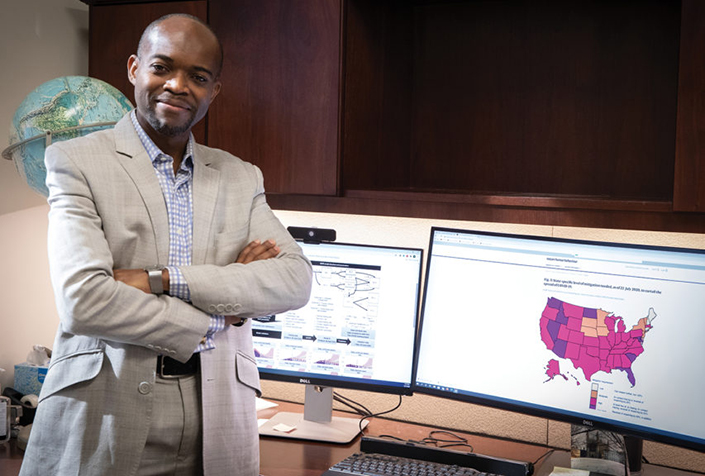Transdisciplinary modeling: Using data to combat disease outbreaks

When an area is struck by disease, chaos can often consume the community as they try to organize in the midst of fear and confusion. Martial Ndeffo, an assistant professor in the Texas A&M College of Veterinary Medicine & Biomedical Sciences’ Department of Veterinary Integrative Biosciences, helps local officials make sense of these uncertain times by diving into the data that will help those officials identify the best responses to control or prevent disease outbreaks.
Ndeffo’s research uses transdisciplinary modeling approaches to identify and address challenges for a range of infectious diseases. Infectious disease modeling uses the mathematical analysis of data to develop quantitative representations of disease systems and their interacting variables, called a model. By developing data-driven models, Ndeffo helps characterize emerging diseases in uncertain situations, identify the best strategies for disease control and prevention, and analyze public health responses from a health and economic perspective to inform public policy.
This life-saving research has taken him around the world, from Ebola outbreaks in West and Central Africa, to studying Dengue, Chikungunya, and Zika outbreaks in the Americas, to domestic work addressing the HIV/AIDS epidemic and HPV in the United States.
Modeling infectious diseases is a challenging endeavor–not only does it require the researcher to enter a chaotic and sometimes dangerous environment, but because emerging diseases are not yet entirely understood, it also requires the modeler to predict the future when the present isn’t entirely known.
Ndeffo explains this challenge as, “as uncertain as your inputs are so your output will be.”
The nature of this research requires investigators to be flexible and adapt to new situations, both in the collection of their data and in their physical environment. Ndeffo explains that when outbreaks happen in countries with fewer resources, the human element of this research can take on an important role.
“When the 2014 Ebola outbreak started in West Africa, especially in Liberia, I was part of a team at Yale University that started to think about how we could contribute to that crisis,” he said. “It was very much a dire situation; it was almost the worst disease in the world happening in the poorest countries in the world.”
A member of Ndeffo’s team had the idea of providing their Liberian field collaborators with laptops and mobile phones to be used for contact tracing efforts, after learning through the Liberian Ministry of Health that many members of their Ebola response teams had been collecting data using pen and paper and travelling long distances to deliver these data by hand to public health authorities for analysis.
“You have maybe a weeklong lag between when the data was collected and when public health authorities are able to look at them and make a decision. By the time the cases were identified, the situation was completely changed,” he said. “One thing that made a big difference was a very simple mobile phone application where you can observe something on the ground and just enter those observations. People in Monrovia, the capital, could access the data in real time, they could make a decision, and you could act in real time in the field.”
Ndeffo thinks this example illustrates the comprehensive view one must take in evaluating pandemic responses. Providing these devices was not directly connected to the team’s task of modeling, but this simple contribution had a considerable impact and saved lives.
Recently, Ndeffo has diverted his research efforts into studying the development of the global COVID-19 pandemic. His work modeling COVID-19 is reminiscent of previous research he has done on emerging diseases, and his adaptive nature is a strength in navigating the challenges of studying a disease that is not yet fully characterized.
“Like any emerging disease, it is difficult to study because there are a lot of unknown factors,” he said. “Having the experience of working on Ebola in 2014, I’m a bit familiar with these types of developing situations, but there’s always a problem in that you will have a lot of things that you don’t know about the disease itself.”
“I think that whether we want to or not, we have to learn something. A lot of things will have to change,” he said. “For society really to come into that place, we need a more multi-disciplinary vision or analysis of what has happened and how to prepare for what might happen. It is very important for us not to do it in isolation but to really bring many disciplines together, because of the multifaceted approach of these situations.”

